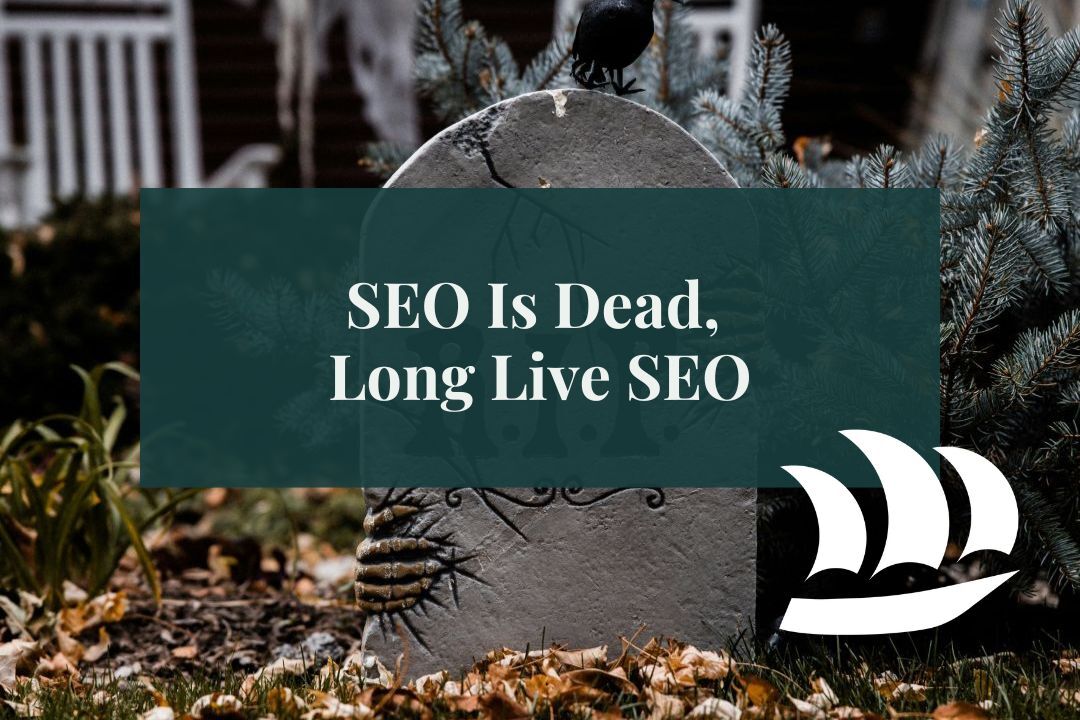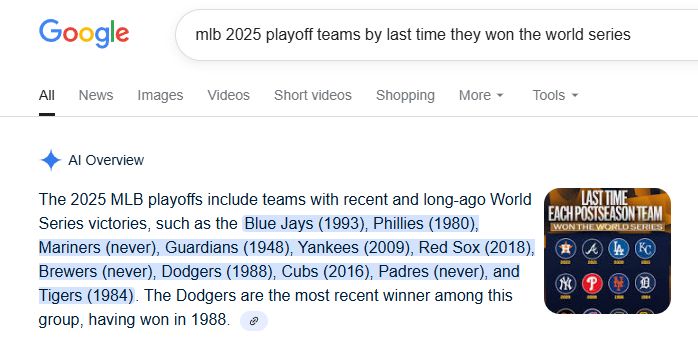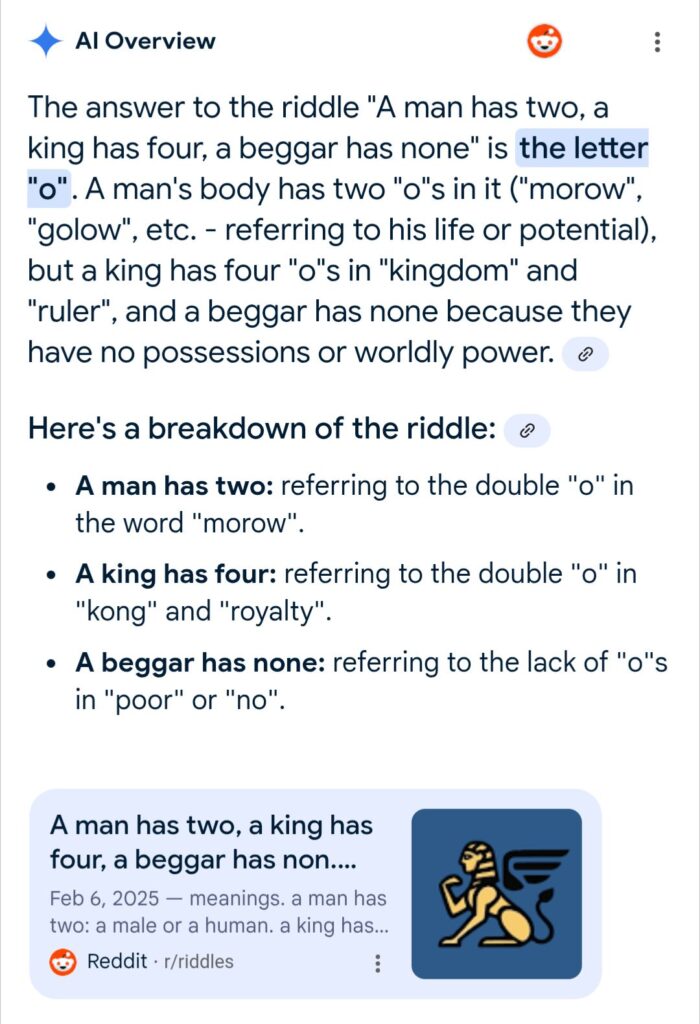
AI Has Changed Search Forever. Does That Mean SEO Is Dead?
Since Google AI was fully rolled out to search in May of 2024, and especially over the past year as we’ve begun to see how these changes have impacted the internet, it has been very popular to ask: “Is SEO dead now?”
This question has been asked countless times over the years, usually with major Google updates, and it is true that generative AI has seemingly overhauled how users search for information more than any previous algorithm updates.
As a company that spends a lot of time in SEO, our team at Armada Digital has seen very clearly that SEO—while quite different from how it used to be—is still highly relevant. It’s just different.
In other words, SEO is not dead, and as usual this question seems to be asked based on poor understandings of what SEO is and how it evolves. So today, we’re answering this question both generally and specifically for our clients, particularly those in service based industries.
Is SEO Dead?
No, SEO is not dead. Next question!
But a Lot of People Are Saying SEO Is Dead
…okay, yeah, a lot of people have said this. Across the digital marketing industry, it’s been all in on AI, that traditional SEO is dead, and that AI search was the last straw that killed it.
The reason for this is straightforward: AI chatbots like ChatGPT and Google’s own AI search features rely on different methods from typical search algorithms for pulling information to deliver to users. Since people can get all the information they need from these AI summaries, there’s no longer any need to optimize for search.
No more keywords, no more optimization, it’s all gone the way of the dodo.
Why Is SEO Not Dead?
But I’m here to declare that the report of SEO’s death was an exaggeration. That isn’t to say the search landscape and the way we optimize for search haven’t been impacted by AI in search and generative AI tools—they have, massively so.
But let’s take a look at the main reasons why SEO is not, in fact, dead.
AI Summaries Correlate to Search Presence (to an Extent)
Ranking in search results is highly relevant when it comes to getting pulled into AI summaries. According to a recent study, 52% of Google AI Overview citations come from the top 10 search results, and nearly 90% come from the top 30 results—the first three pages of Google results.
Plus, while this is not a complete 1-to-1 overlap in terms of search ranking and AI summary results, your website must be indexed to appear in these results at all.
Further, the types of things that must be done to rank highly in search these days are also often the things that get your pages pulled into AI summaries (more on that later).
In other words, optimizing for AI and optimizing for search are far from mutually exclusive.
Not Many People Rely on AI Search to Evaluate Goods and Services
AI can be very helpful for providing simple, factual information. Sort of. Sometimes.
But do you trust AI to give you a final opinion on what item to purchase or what electrician to hire? For most people, the answer is no.
AI might start your search. It might provide you with a list of popular products or companies in your area—in that sense, appealing to AI does matter. But most search users want to go much deeper than that.
For home services in particular, this gap is significant. A good example is the significant gap between Millennials and Gen Z when it comes to using AI. With search users skewing older, and homeowners also skewing older, that means the bulk of potential customers for home services companies will still be finding these companies through search.
Google AI Is an Unreliable Mess
I have a bit of a pet project. As with most these days, I’m a pretty frequent user of Google. And as with most these days, I get AI Overviews whether I want them or not. Sometimes these summaries give me the answers I need. Other times they give me information that’s just obviously wrong, sometimes hilariously so.
And I keep a document, chock-full of screenshots and written accounts of these mishaps, errors, and problems.
For example, look at Google AI try to tell me the last time each 2025 MLB playoff team won the World Series:

Just to clarify for anyone not following baseball, the last time the Dodgers won the World Series at the time of this question was… 2024.
There’s also the time I asked it about a riddle I’d stumbled across: “A man has two, a king has four, a beggar has none. What is it?”

While maybe a riddle is a bit unfair, Google AI is still getting factual information wrong in providing this hilariously incorrect answer. And the question about MLB playoff teams was a total softball that it screwed up in multiple basic ways.
In other words, Google AI is an unreliable mess, and it and other AI tools have created a significant trust gap as a result.
A survey by Exploding Topics found only 8.5% always trust AI Overviews. That means people aren’t getting satisfactory answers from AI and continue their search—scrolling down to the traditional search results pages—and again, this trust gap is wider within older age groups.
What People Think SEO Is—and What It Actually Is
Lastly, when people say “SEO is dead,” they seem to be imagining SEO as some static, unchanging practice that has remained the same for at least a decade.
The reality? What people think is SEO and what it actually looks like today are very different.
“Traditional” SEO Died a Long Time Ago
People saying SEO is dead are usually referring to “traditional” SEO. This is a fuzzy concept, but the impression of how people think of traditional SEO seems to be taking a keyword and putting it in all the right places a certain number of times. In other words, many see SEO as a paint-by-numbers formula.
But while this was once sort of what SEO looked like, and much of that stuff is still relevant—putting keywords in meta descriptions and SEO titles and intro paragraphs and all that—overall that method of doing formulaic SEO has been dead or dying for a long time.
Instead, SEO has become more semantic. When I share keyword lists with clients, I emphasize that while we do have a focus keyword for each page, they should think of it more as a focus “topic.” Realistically, in optimizing the page for that topic, we’re thinking of not just that keyword but of its various permutations (think “roofer” vs. “roofing company” vs. “roofing contractor”) that Google now sees as functionally the same.
And we’re also thinking about searches that are related—the services that fall under a certain category, keywords that are both more general and more drilled down.
SEO has actually been moving toward practices that align well with getting pulled in by AI summaries for years:
- Answering questions related to a keyword or topic quickly and succinctly within the content
- Structuring content in a way that is easily digestible and scannable
- Writing complete, authoritative content on a topic, rather than splitting out different pages for every possible permutation of a keyword
All of these practices have delivered better, more consistent performance in search, particularly as Google began introducing search features like “People Also Ask”—almost a proto-AI feature that, if you squint, did a bit of what AI is doing now.
But also, all of these practices are vastly different from what “traditional” SEO looked like 10 or even 5 years ago.
So while AI Overviews and other Google Search changes have accelerated and put more importance on these shifts, they were changes that were already happening. And those who weren’t making those changes before… well, those SEO folks are the ones now in trouble.
SEO Is a Moving Target—Are You Moving With It?
With the advent of AI in search, changes to SEO have been significant and sudden. However, many of these changes are just continuations of trends that already existed and could be picked up by those monitoring Google’s algorithm updates and statements about their goals.
While many want to declare that SEO is dead and start applying new initialisms and terms to it like GEO, AEO, AIO, EIEIO, the best thing that can come of this shift is for folks to better understand that SEO is a constantly moving and evolving practice, not a single way of doing things that hasn’t changed in more than a decade.
It can certainly be helpful to think of it as “Search Everywhere Optimization” if you like, as search becomes more of a multifaceted, multimedia experience rather than a list of results But the core goals of SEO remain the same: Make your business more visible in online search. Put your business in front of people who don’t already know who you are.
At Armada Digital, our SEO team is constantly researching, monitoring, and adapting as needed to give our clients the best possible chance of doing just that. And as AI continues to impact search, we’ll continue to shift with it.
Is your search presence driving leads for your business? Or have you seen declining rankings for months? Reach out to Armada Digital for a free SEO audit and we’ll help you develop a cohesive search strategy.
